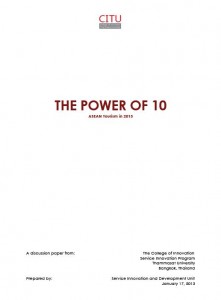
18 Jan, 2014
Why clean toilets are important for the future of ASEAN Tourism
Kuching — It may sound like a laughing matter, but the move to start an ASEAN tourist toilet clean-up is actually a serious issue, with broad ramifications for the future of ASEAN tourism.
 In 2015, if current levels of tourism growth are sustained, ASEAN visitor arrivals will cross the 100 million mark (click on the image to DOWNLOAD FREE “The Power of 10”, a detailed statistical analysis by the College of Innovation, Thammasat University). Add about five times as many domestic tourists, and the number of annual travellers hits roughly 600 million people, about the same as the entire ASEAN population. While the ASEAN tourism industry may salivate at the economic opportunities of those numbers, consider these corollary questions that will arise almost immediately:
In 2015, if current levels of tourism growth are sustained, ASEAN visitor arrivals will cross the 100 million mark (click on the image to DOWNLOAD FREE “The Power of 10”, a detailed statistical analysis by the College of Innovation, Thammasat University). Add about five times as many domestic tourists, and the number of annual travellers hits roughly 600 million people, about the same as the entire ASEAN population. While the ASEAN tourism industry may salivate at the economic opportunities of those numbers, consider these corollary questions that will arise almost immediately:
- How much water will 600 million domestic and international tourists use, especially in the toilets? Where will all the waste-water be disposed? Is the sewage-treatment capacity in the area enough to cope with the growing numbers? How many recycling plants will be needed? Recalculate the same numbers based on growth projections over the next five years. And over 10 years.
- Who will do the cleaning up? Certainly, tourism will create more jobs for toilet-cleaners. In fact, theirs would be one of the industry’s most important jobs, far more than the overpaid branding guru. They may be poorly-educated but as human beings, will they get the respect and the remuneration they deserve? Will their working conditions be in accordance with the criteria classified by the UN International Labour Organisation as “decent jobs”? If not, consider what could happen if they get unionised and go on strike?
- In a few of the ASEAN countries, the toilets will be cleaned not by the locals but by migrant workers. That will open up a whole new issue about labour supply for travel & tourism. Is the industry ready to deal with the issues?
- Is it time to redefine the meaning of the word “infrastructure”? ASEAN has spent years building airports and highways, but obviously did not consider clean toilets as infrastructure. Why not? Is ASEAN tourism now going back to the basics?
- Why not sell advertising space in the toilets and share the income with the cleaners? Toilets command a captive audience with no shortage of eyeballs. The benefits for income redistribution and poverty-alleviation will be phenomenal.
As tourism grows alongside transportation networks and facilitation measures, so will the importance of clean toilets, especially for the growing legions of persons with disabilities. People may pass through the best airports in the world but the quality of toilets will become an equal measure of standard as the time it takes for baggage to arrive.
Clean toilets also help boost competitive advantage. Along the Asian Highway, many petrol stations advertise clean toilets to attract drivers and their passengers. A toilet-break at a clean facility drives other forms of revenue, such as sales at the mini-marts and food outlets.
Clean toilets also will impact on the image of a country. Dirty toilets will lead to a slew of complaints on Trip Advisor and various social media.
The ASEAN NTOs’ recognition of clean toilets as a conduit for tourism flows is long overdue. Take it a few steps further and ASEAN is clearly confronting the gargantuan task of managing tourism growth, especially the impact on waste/garbage/sewage disposal and water/energy usage.
Congestion is worsening at Angkor Wat in Cambodia, the Grand Palace in Bangkok and destinations such as Pattaya, Phuket and Bali. So far, nothing on the ASEAN tourism agenda indicates any preparation to cope with it.
A fundamental policy shift is required. ASEAN tourism leaders need to forget about being far-sighted visionaries and start focussing on the fundamentals. A complete rethink is required of the way tourism is approached.
The ASEAN Tourism Plan will run its course in 2015. The next plan must be entirely oriented towards sustainability and management.
The era of creating growth is out. Managing growth is in. Tourism is no longer just about job creation and foreign exchange earnings. It is about waste management, consumption of natural resources and yes, clean toilets.



Liked this article? Share it!